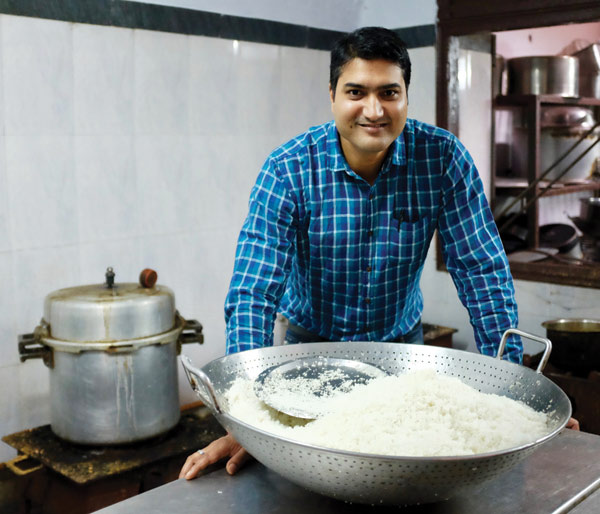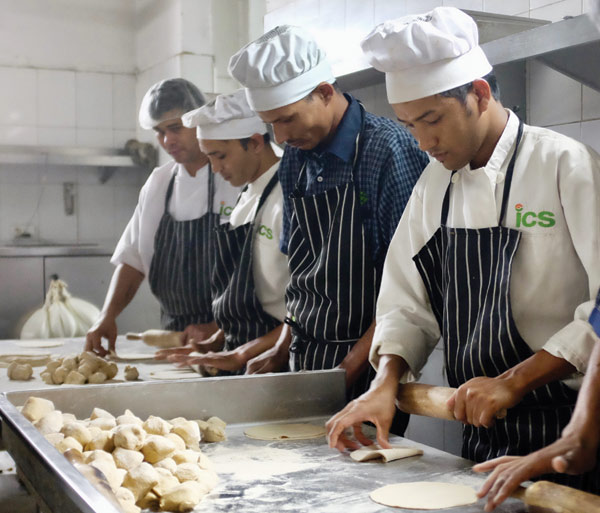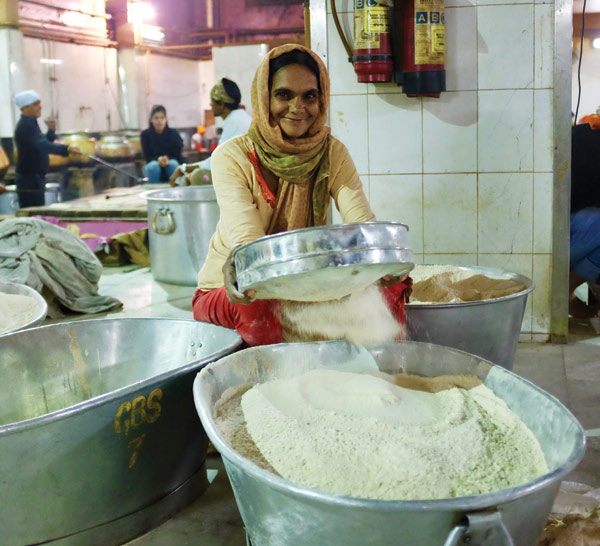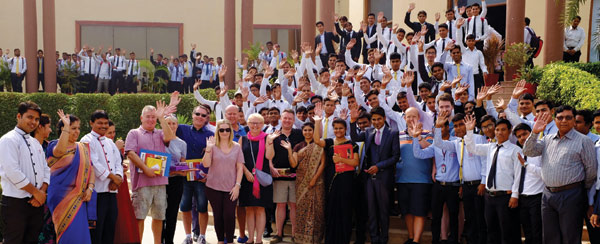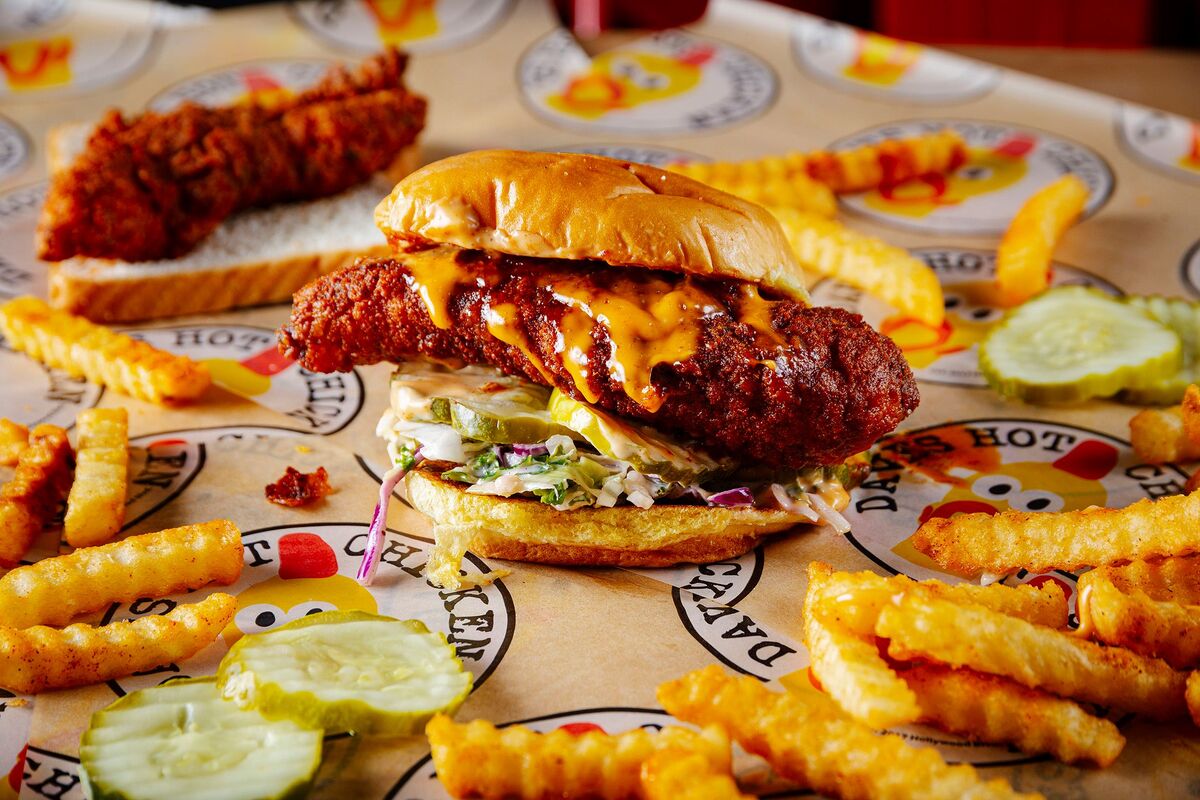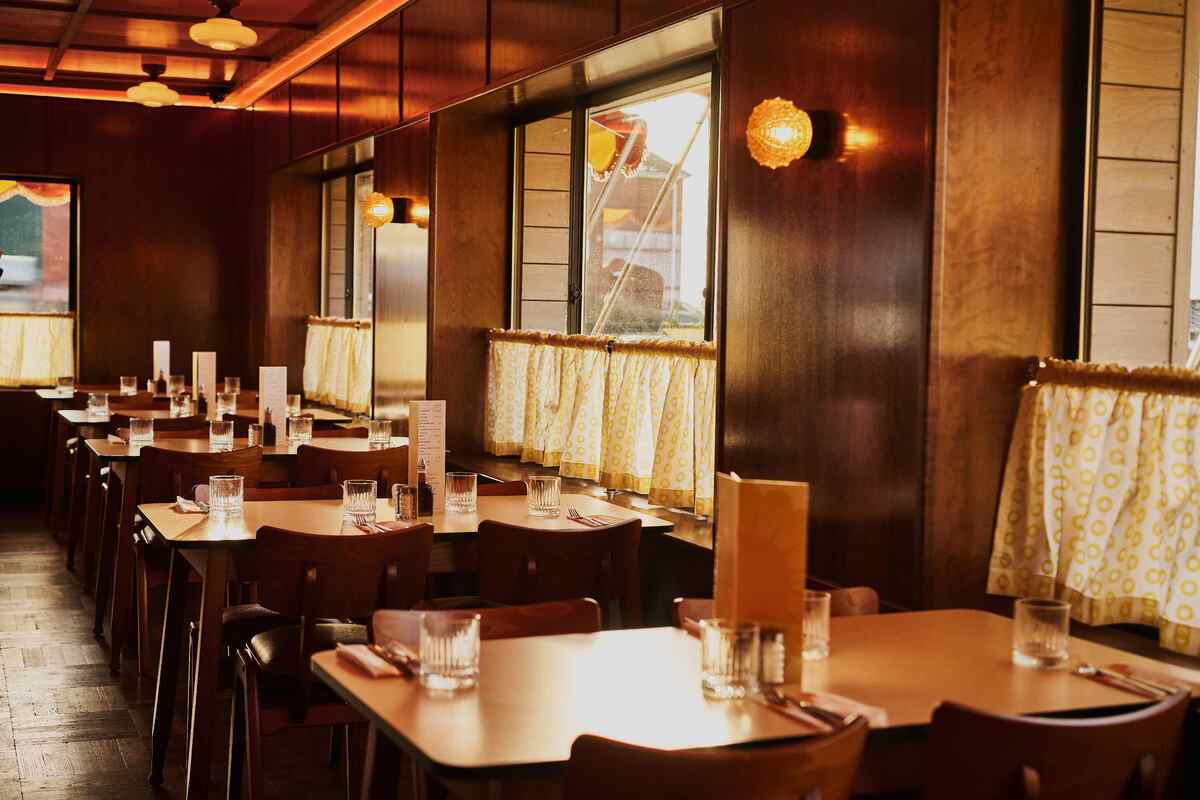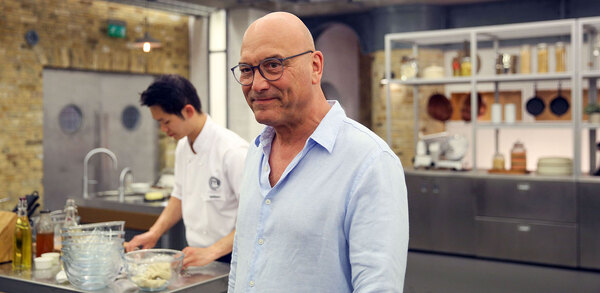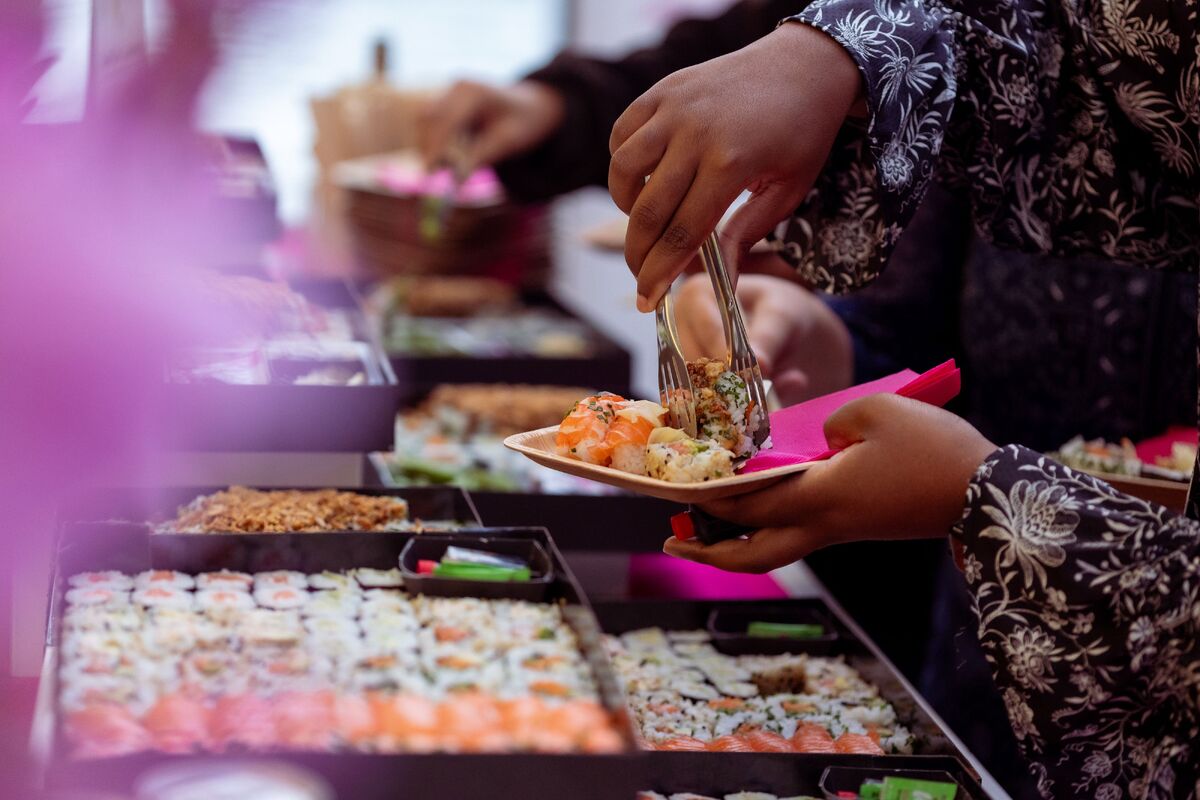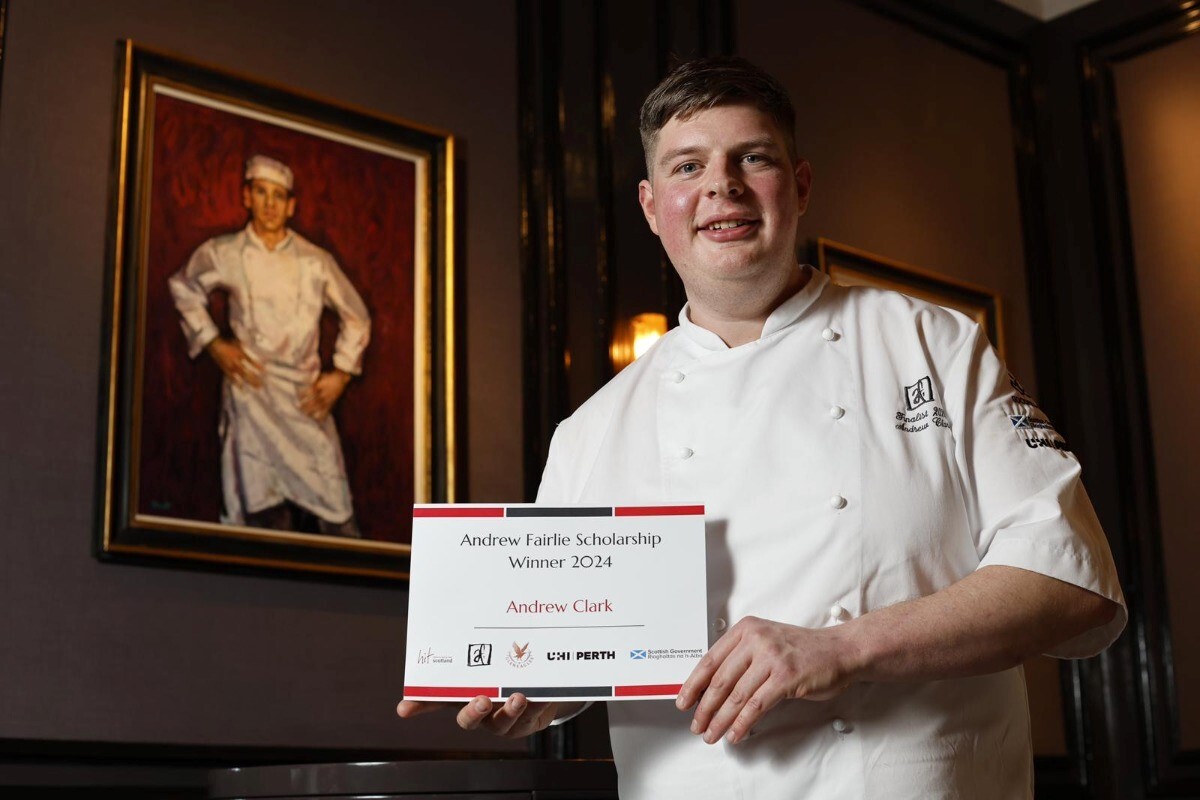A passage to India: university catering on a grand scale
Catering managers from the University Caterers Organisation embarked on one of their most ambitious study tours to date, examining the higher education foodservice in North India. Richard McComb reports
The breakfast service in Delhi is decidedly different from the offer at Reading, Manchester, St Andrews and the other universities represented by UK catering managers. That's because the morning menu at St Stephen's College, in the Delhi university enclave, features upma, a thick, spicy semolina pudding; sambhar, a lentil-based vegetable stew; and chole bhature, a fluffy, deep-fried bread with chickpeas. There is not a croissant, bacon sandwich or skinny latte in sight.
Breakfast at St Stephen's is part of a three-meal plan that costs students 87 rupees (about £1) a day. The majority of undergraduates and postgraduates eat all their meals in the college's traditional dining hall, which is equipped with polished wooden tables and benches and has a high table for staff and guests.
The college's food operation, run on a non-profit model, provides delegates from the University Caterers Organisation (TUCO) with their first glimpse of catering in India's vast higher education sector. The population of this sprawling nation has surged to 1.3 billion, and India is poised to overtake China as the world's most populous nation in less than a decade.
There is an unrelenting drive by university caterers to make the most of precious food resources. As in the UK university sector, the pursuit of quality products and a desire to offer a diversity of dishes have to be balanced with cost. The difference is that in India, where 22% of the population live below the poverty line, the pressure is even more acute.
The menu at St Stephen's is decided by a food committee comprising staff and students. Managers at the institution, which was founded in 1881 and is a Christian constituent college of the University of Delhi, admit there are
Dining hours are less flexible than the UK. Breakfast is served 8am-8.45am, lunch is 12.45pm-2pm and dinner is 7.45pm-8.30pm. Meals are produced by a team of 23 split over two shifts, including permanent staff, part-time cooks and contract staff. Chicken biryani, chicken karahi and shahi paneer (a cheese coated in tomato purée with spices and cream) are the most popular dishes. Students can supplement their main meals with snacks from a kiosk-style food outlet, or dhaba, serving tea, cold drinks and sandwiches. A small canteen sells light meals and snacks, such as aloo paratha (flatbread with potato) for 24 rupees (28p).
Immersive experience
The TUCO group, led by chair Matt White, comprises representatives from eight UK universities and Bidfood development chef Craig Miles, who is looking to develop Indian dishes for the student market. The North India study tour follows the success of the organisationâs ambitious trip to China in 2015. India is the fourth-biggest territory for international university recruitment, responsible for 16,745 enrolments in 2015/16, according to the Higher Education Statistics Agency. The tour aims to broaden membersâ understanding of Indian food and foster professional development through cultural engagement.
Trips to holy sites, glittering palaces, historic forts and the Taj Mahal, one of the seven modern wonders of the world, are interspersed with university visits and a broader familiarisation with Indian food, including a culinary masterclass at a family home in Delhi and a ride in a rickshaw to the cityâs famous spice market at Chandni Chowk.
A 35-mile coach trip out of Delhi to Shiv Nadar University takes several hours through heavy traffic. Visibility is down to a few hundred yards due to some of the worst smog the capital has ever seen. Shiv Nadar University, a state/private institution, was established in 2011 and represents the new face of higher education catering in India.
The university is home to 2,300 students across undergraduate, postgraduate and doctoral programmes, and all catering is outsourced on two-year tenders. Dining is focused on two large cafeterias: Dining Hall I and Dining Hall II. Students rotate to different halls each semester.
Catering services are currently operated by contractors ICS Hospitality Services and Azure Hospitality. The halls also have outlets selling milkshakes, savoury snacks, burgers and hot rolls. However, a Kit Kat shake is 70 rupees, about half the cost of the set daily meal plan. Lighter meals and snacks are offered at a café in the library and at five âtuck shopsâ around the campus.
The food on the standard meal plan is exclusively Indian, at least on the day of the TUCO visit. The food is served on sectional metal trays in both cafeterias. The vegetarian lunch menu in Dining Hall I features a biryani with a Hyderabadi mirchi ka salan (a chilli-fired curry), a Punjabi dhal and a boondi raita (boondi are tiny, deep-fried balls made from chickpea flour). The meat option, generally restricted to chicken and âmuttonâ (typically goat), is chicken biryani.
There are prominent signs warning of the environmental and social consequences of food waste. A Love Food Not Waste poster tells students: âPlease take only what you need.â
Crossing continents
A visit to the Heritage Institute of Hotel and Tourism (HIHT) at Agra, a city over 100 miles away to the south of Delhi, demonstrates how the country is preparing the next generation of hospitality professionals. The institute offers one-year certificates and three- and four-year vocational undergraduate programmes, including a popular BSc in hotel management and catering technology. The degree courses cover just about every element of hospitality, including chef skills (from basic to advanced), food and beverage service, housekeeping, reservations and front office.
The enthusiasm of the students, and their passion for the hospitality business, is infectious. Anandita Singh, 19, who was named the instituteâs âbest fresherâ, is studying food production and front office, and says her âdreamâ would be to work in the UK. TUCO delegates are left to reflect on the huge pool of talent on the Indian subcontinent.
White adds: âIndia has been a whirlwind of amazing sights, sounds and smells, and it is a completely different world for us. This has been the riskiest programme we have run. To a degree, we had to play safe, and there are things we have learned for future visits, but we have all found something we will take back to our institutions.
âThe great thing about being in a group is that you bounce things off each other. Not only have we talked about all things India, we have also talked about the everyday issues in our workplace and how we can help each other. It has been a superb opportunity for personal and professional development.â
The chef's perspective
Bidfood development chef Craig Miles is planning a 12-recipe Indian food booklet for UK universities using the culinary insights gained on the North India tour.
Miles had a productive session in the kitchen at the luxury ITC Mughal hotel in Agra, where executive chef Bhaskar Sankhari explained the huge variations in regional food in India.
The 233-bedroom hotel, set in 35 acres of grounds, has three dining options â" two large buffets and the open-kitchen Peshawri, which serves north-west barbecued specialities cooked in a clay tandoor and Indian breads.
ITC Mughal shares a core menu with other ITC hotels, but individual chefs offer their own specialities to cater for local tastes. âPeople in Delhi wonât eat what people in Agra eat,â says Miles. âChef Sankhari, who is from Mumbai, has chefs that wonât eat what he calls comfort food. He will go for regional food, such as dosas and dhals. His younger chefs are more into KFC, Subway and McDonaldâs.â
The global gentrification of food is presenting challenges as chefs seek to preserve the integrity of Indian cuisine. âYounger kids are asking at home for non-traditional Indian food, which parents donât understand. They want pizzas and burgers,â says Miles.
âThe executive chef says the next generation will be a lot broader with their food choices, such as wider Asian foods and Italian food. He thinks things will evolve, but he is worried that chefs are not coming through with the skillset for making traditional Indian food. The problems they are having are not dissimilar to the problems we have in the UK.â
As in the UK, the hospitality sector in India faces major challenges with recruitment. âYoung people will look at IT jobs and jobs with a work-life balance. They work to have a social life first. With chefs, work usually comes first,â says Miles.
The ITC Mughal has improved its employment offer for kitchen staff by providing accommodation and assistance for employees travelling to work. âChef Sankhari lives on-site, which is a real perk in India,â adds Miles.
Milesâ Bidfood recipe booklet for UK universities will look at breakfast dosas, healthy dhals, and, of course, butter chicken.
âWe need a really good Indian offer in a grab-and-go style,â he says. âWe are seeing a massive growth in vegetarian/flexitarian diets, and this is a great match for Indian food. I have eaten vegetarian food for breakfast and for other meals during the tour, and I have not missed the heaviness of meat. If you offer really good vegetarian food, it will tick a box with UK students.â
Videos from The Caterer archives




